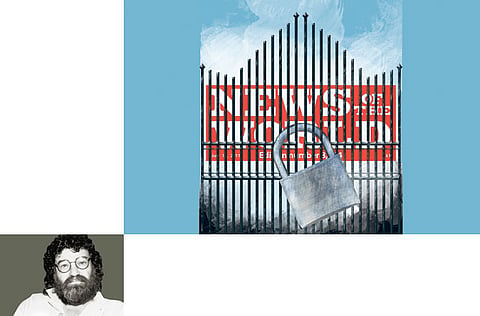Lived and died by scandal
Few will mourn the demise of News of the World which reported on the lives of the rich and famous

The death of newspapers in society is like the death of kings on a chess board — traumatic. Except, however, for those readers — seemingly with an IQ slightly higher than that of a cabbage — who got a cheap thrill out of reading publications whose role in the journalistic enterprise was to ferret out and report on bad nasty things going on in the lives of celebrities. No one will mourn the death of News of the World — a sorry excuse for a newspaper, that put out its final issue last Sunday.
The demise of News of the World came about not because of financial woes, loss of circulation and diminished advertising revenue, the tragic plight of newsprint in recent years, but due to scandal, involving questionable practices unbecoming reporters and editors. These alleged practices included what now appears to be criminal intrusion, via phone-hacking attempts and other illegal information-gathering, into the lives not only of ordinary citizens but of British royals, a former prime minister and a murdered schoolgirl. No one was safe.
But the death of a newspaper reminds one of how in recent years, dozens of responsible print media have been left by the wayside in this internet age of ours.
Perhaps because I'm an old geezer with old-fashioned ideas about the role of the printed word in our lives, and a technophobe to boot, reading the news on a screen does not cut it for me. I still want the feel of paper, and the smell of ink, that I get from holding a publication in my hands, that live friction between the tactile and the olfactory, as I want the in-depth analysis found in a news report that I know a journalist had spent days, weeks, perhaps months investigating, a news report vetted by editors and fact-checkers before it saw the light of day in print, hardly the mode of operation in the chaotic world of the internet.
Engaged Americans know about the contribution of prominent print journalists, all the way from H.L. Mencken to I.F. Stone, from Seymour Hersh to Bob Woodward, and from Dana Priest to Anna Quindlen, that changed their lives and enlarged the compass of their awareness in the world they inhabit. Without that contribution, there would have been, respectively, no satirical report on the Scopes trial (dubbed the Monkey Trial); a challenge, in 1964, of President Johnson's account of the Gulf of Tonkin incident; a scoop on the massacre of Vietnamese civilians at My Lai; an exposure of President Nixon's shenanigans in the White House during the Watergate affair; a shattering story that revealed the existence of secret prisons, run by the CIA, where terror suspects were held captive, and tortured, at facilities in Soviet-era compounds in Eastern Europe; and no op-ed columns that so astutely captured baby boomers' social and political preoccupations in the 1980s. With these folks, and countless others like them, on the beat, America was transformed. When a favourite publication of yours, that you had been used for years to pick up at a newsstand or have delivered to your mailbox, folds, it's like a death in the family, the vacuum difficult to endure.
Mumbling senility
Now the venerable Washington Post, once a respected institution in the American capital, whose investigation of the Watergate affair brought down a president, is struggling, ever so mightily, to hang on. It has laid off most of its staff, closed down many of its bureaus overseas, and drastically reduced its coverage of both national and international news. Lacking even the resources to keep on the job decent copy-editors, proof-readers and fact-checkers, it is prone to letting slide the most glaring typos, even grammatical mistakes, in its news reports.
Consider, as an example, the lead sentence in an article in last Sunday's Sunday Style section, titled "MSNBC's incarceration series has lock on ratings", by one Jack Curry: "‘Lockup' is the crazy rich uncle of MSNBC, the relative whose gifts you accept, but whom you keep stowed away in the attic".
The Washington Post, now a ghost of its old self, has become like an elderly relative, who had gone slightly senile, mumbling avuncular incoherencies to himself as he sits in a rocking chair on the porch. (And, yes, I'll look forward to watching Lockup, a show about an uncle who is stowed away in the attic.)
A democracy survives when in society citizens have access to trustworthy, impartial and, as is sacrosanct in the profession, double-checked sources of information. As the legendary Lebanese-American reporter, Helen Thomas, once opined in a pithy observation on how double-checking is an absolute rule in journalism: "If your mother tells you she loves you, double-check it".
What will happen when newspapers disappear and we find ourselves — Oh, the horror, the horror — having to seek refuge in the ideological ghetto of the internet?
Like the death of kings on the chess board, I say, the death of newspapers is a traumatic event.
Meanwhile, the world is a better place without News of the World, a ‘newspaper' that defined reporting by the stories it published on the lives and nebulous pursuits of the rich and famous. Let it go to forgotten dust, then, where it belongs.
It is ironic, though, is it not, that in the end News of the World, a tabloid that lived by scandal, died by scandal?
Fawaz Turki is a journalist, lecturer and author based in Washington. He is the author of The Disinherited: Journal of a Palestinian Exile.


